 Choosing keywords can easily become an overwhelming and costly part of your content creation and SEO strategies. And that’s why in this post, I’ll lay out a step-by-step strategy you can use to find the best keywords for your website or blog…using only FREE tools.
Choosing keywords can easily become an overwhelming and costly part of your content creation and SEO strategies. And that’s why in this post, I’ll lay out a step-by-step strategy you can use to find the best keywords for your website or blog…using only FREE tools.
Each marketer will have his or her own unique process for finding keywords, so if there are other tools or strategies you want to incorporate into this process, please do! This guide is just one way to find popular and relevant keywords; not the only way.
For the purposes of this article, I’ll assume we’re looking for a keyword to target on the home page of a fictitious bakery. However this process can easily be replicated when looking for keyword ideas for blog posts, product pages or virtually any other type of content. The basic process will look like this:
- Brainstorm
- Choose the most relevant keywords
- Investigate traffic volume and level of competition
- Find synonyms and variations to supplement your content
Step 1: Brainstorm potential keywords.
The first stage – brainstorming – is one of the most important, but is also one many marketers gloss over. Rather than jumping into the keyword research process with one or two keywords or phrases in mind, take some time to compile an exhaustive list of topics or themes related to your business or products. For instance, if I was a professional baker, I may list keywords like ‘baker San Diego’, ‘bakery California’ or ‘best cakes San Diego’. At this point there is no right or wrong; simply get down as many possible keywords as you can think of that are related to your business. Some strategies you can use to brainstorm possible keywords include:
- Industry journals or magazines
- Your own marketing materials
- Asking your sales team or other staff for suggestions
- Checking out which keywords your competitors are using on their sites
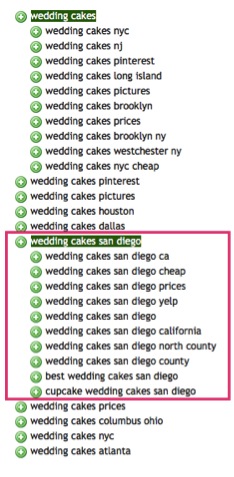 Ubersuggest is a great free tool to use at the beginning of your brainstorming process. Simply type in a keyword or topic, and receive hundreds of related keyword suggestions. If you find a term you’d like to investigate further, simply click on it to receive more suggestions that use that term as a base.
Ubersuggest is a great free tool to use at the beginning of your brainstorming process. Simply type in a keyword or topic, and receive hundreds of related keyword suggestions. If you find a term you’d like to investigate further, simply click on it to receive more suggestions that use that term as a base.
Using the example above, let’s say my bakery specialized in wedding cakes. I type in ‘wedding cake’, and then notice that ‘wedding cakes san diego’ is included in my list. I click on that link to drill down and find even more specific terms I can use:
Remember: At this point you’re only brainstorming. This list won’t give you any indication of how popular a term is, or how difficult it will be to rank for. At this stage, you’re just looking for terms that will be broadly relevant to your business, products or content.
Step 2: Select the Most Relevant Keywords.
Now it’s time to choose the most relevant keywords from your list. Ask yourself: If I was a customer looking for my product (or content), which terms would I be mostly likely to search for? And which ones would be most likely to drive sales? (hint: more specific, ‘long tail’ keywords will often result in higher conversions). After considering all the keywords on my list, I’ve decided to do further research into the following, highly-relevant terms:
- Wedding cake San Diego
- Best wedding cakes San Diego
- Bakery San Diego
- Cakes San Diego
Step 3: Use Google’s AdWords Keyword Planner to Check on Volume and Competition.
Now that I’ve determined that ‘wedding cake San Diego’ is the term I’d like to focus on, it’s time to figure out whether that term is:
a) Worth targeting (i.e. it gets enough monthly searches), and
b) Possible to rank for (i.e. there aren’t a ton of other sites trying to rank for it).
Go to the Google Keyword Planner and sign in or create an account (you must have an AdWords account to access this tool, but signing up is free). For our purposes, choose ‘Search for new keyword and ad group ideas’ once you’re logged in.
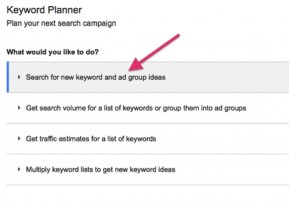
On the next page, enter in the keyword or phrase you’re thinking of targeting. In our case, we’re going to try ‘wedding cake San Diego’.
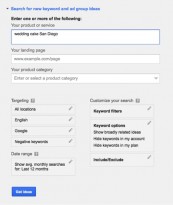
Next, be sure to select the ‘Keyword ideas’ tab, NOT the ‘Ad group ideas’ tab. The Keyword ideas tab will give you two pieces of critical info about your keyword or phrase: the average monthly search volume, and the level of competition.
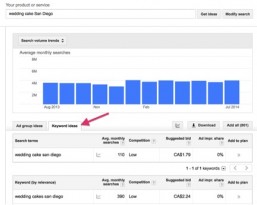
After plugging in ‘wedding cake San Diego’, I see that while it doesn’t have much competition (“Low”), it only receives around 110 monthly searches. While this may be a good term to include on my site, I likely won’t want to commit to targeting such a low-volume keyword on my home page.
Moving down my list of relevant keywords, I run searches for ‘best wedding cake San Diego’, ‘bakery San Diego’, and ‘cakes San Diego’. This process reveals that the most popular and least competitive of my relevant keywords is ‘bakery San Diego’.
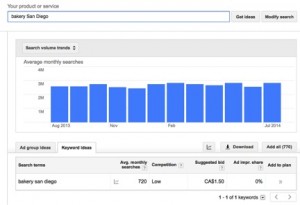
Step 4: Find Keyword Variations and Related Terms to Incorporate Into Your Content.
As Google’s algorithms become more sophisticated, sites that do a thorough job of covering all angles of a topic tend to rank best. This means that each piece of content you produce should include not just one or two main keywords, but many different variations, synonyms and long-tail phrases related to your topic.
One way to brainstorm these related terms is using Google’s Related Search function. Here’s how to do it: Type your chosen keyword into Google Search, and then scroll to the bottom of the page. You should see a section titled ‘Searches related to…..’. These are other words or phrases Google deems relevant to your chosen keywords.
For instance, when I run a Google search for ‘bakery San Diego’, I get related searches like ‘bakery San Diego hillcrest’, ‘bakery San Diego convoy’ and ‘bakery San Diego downtown’. While these phrases likely don’t have enough search volume to justify targeting them as my main keywords, they are phrases I can incorporate into my content to capture related long tail searches.
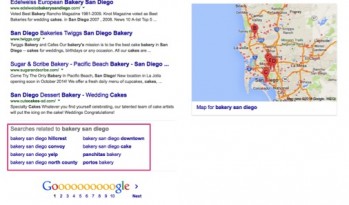
And there you have it! Using this process, we’ve been able to find one main keyword for our homepage (bakery San Diego), which we know has a decent number of searches and low competition. We’ve also been able to find some related search terms that will help us rank when it comes to long tail search.
Keep in mind that no process or tool is perfect: for instance, the Google Keyword Tool is notorious for underestimating the search volume of a particular term, and only provides results based on exact match type. However, the tool still provides a good, basic foundation for narrowing down your keyword choices.
What free keyword tools do you use for your own keyword research? Share with us below!
To view the original article Click Here

Keywords are very important to your website because without them your website theme will not be focused and as a result it is more likely that you will not rank well in Google. how to check for plagiarism free
ReplyDeleteReally nice information. And even the keyword is the preliminary step for any online business. Thank you for sharing the nice information here. Thank you so much
ReplyDeleteSEO Company in Chennai
SEO Company in India
Digital Marketing Company in Chennai
Digital Marketing Company in India